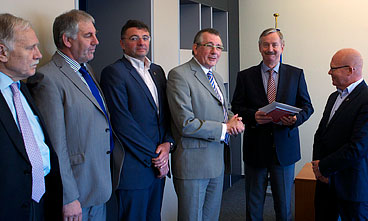Brussels must not leave truck drivers out in the cold
Brussels must not leave truck drivers out in the cold
SP Euro-MP Dennis de Jong this morning handed over the first available copy of ‘De Chauffeur aan het woord’ (‘The Driver Speaks’) to European Commissioner for Transport Siim Kallas.
‘De chauffeur aan het woord’ has been compiled on the basis of the findings of an enquiry into road transport which included a survey of nearly 3,000 truck drivers. It contains a list of recommendations as to how an end might be put to appalling conditions in the road transport industry.

SP Euro-MP Dennis de Jong hands the first available copy of ‘De Chauffeur aan het woord’ (‘The Driver Speaks’) to European Commissioner for Transport Siim Kallas.
‘The drivers have many suggestions for how to combat abuses such as the use of shell companies which amount to no more than a postal address in order to pay lower wages, or frauds involving training certificates and permits,’ De Jong explains. ‘We’ve made a compilation of these proposals, discussed them with other political groups and offered them to Commissioner Kallas. He’s promised to do something about them, which is great, but we’ll be putting pressure on him to hold to this, because in the autumn we want to start seeing concrete results.’
The Commissioner said that he found the proposals ‘reasonable and realistic’. De Jong notes that while he finds ‘this reaction positive’ he had ‘during the meeting asked him to be more concrete. This autumn I want to see an official announcement from the Commission setting out a range of practical steps aimed at putting an end to abuses. These should deal with the clarification of the existing rules on cabotage, in order to tackle abusive firms and enforce the principle of equal pay for equal work. In addition an end must be put to the practice of always picking on drivers from the Netherlands and other countries where they tend to speak foreign languages and pay up when fined, while others go scot free. We’ll be putting pressure on the Commissioner via the European Parliament’s Transport Committee, as well as by organising – together with the drivers and haulage firms - a round table conference later in the year.’
The employers and unions share a positive response to the recent trend in Europe as it relates to road transport, as Edwin Atema of major Dutch trade union federation FNV explains. ‘Truck drivers have communicated with the EU authorities repeatedly during the last few months. There have been national and international actions against the relaxation of cabotage rules proposed by this Commission and against social dumping. Not only have these plans now been put into the deepfreeze, the Commission is getting serious about enforcement. Fighting back creates priorities!’ Peter Sierat of Transport en Logistiek Nederland (Dutch Association for Transport and Logistics - the largest and most prominent lobby organisation in the Dutch road transport and logistics sector) says that ‘tackling those who break the rules is of great importance, so we’re happy with any additional attention being paid to increased enforcement within the Netherlands and in this way combatting unfair competition in the transport sector.’
The complete publication De vrachtwagenchauffeur aan het woord is available only in Dutch. However, below we present a summary of the most important recommendations:
Cabotage rules
The cabotage rules must be tightened up and clarified. The existing rules permit three runs per member state per week, after which a truck must have left the member state in question before further domestic shipments may be picked up. We want the truck first to have to have returned to the country in which it has its registration. Moreover, we want a limit imposed of ten domestic shipments within a three month period.
Monitoring
The member states must make clear agreements over the minimum number of road transport checks and on the use of adequate means to make effective monitoring possible. Checks must not discriminate against drivers from particular member states.
The European Commission must as soon as possible conduct a survey of the numerous inspection services within the member states which are involved in monitoring road transport. The member states must provide the Commission with annual compliance reports which make clear the staffing levels and financial resources available and what the inspections have yielded. The various inspection services must not only cooperate more effectively on the national, but also on the European level. Transfrontier monitoring is often more effective than purely national checks.
Tackling shell companies
Shell companies which amount to no more than a postal address and which are used in order to bypass workers’ rights and evade member states’ regulations must be addressed. Every transport company must in all cases have a physical parking space for each of its registered trucks in the country where it is registered. The management of a transport company must be responsible for one single firm, rather than a maximum of four. Transgression of the rules must result in immediate withdrawal of the licence to operate.
Tackling bogus self-employment
Drivers who are in reality waged workers but forced to register as self-employed drivers must be protected from their employers. Employers must henceforth be held responsible for transgressions of the law on drivers’ hours and rest periods.
Payment per kilometre instead of per hour must in all cases be forbidden. Training costs must be paid by the employer. Organisations issuing training certificates must fulfil clear criteria.
Liability
The liability must be tightened up so that the shippers are also made responsible for non-compliance with the rules by the carriers or their subcontractors. The carrier must be listed in the national register of companies, which must be linked to the European Register of Road Transport Undertakings (ERRU). This register must list any transgressions by companies. Inspectors must have real-time access to this register.
Parking spaces
The safety and quality of parking spaces and of sanitary facilities along motorways must be improved.
